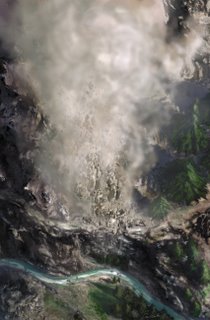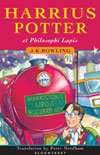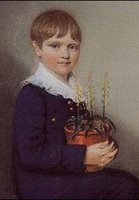
Friday, December 01, 2006
Clayhanger

Sunday, October 22, 2006
Long wont to roam

Helen, thy beauty is to me
Like those Nicean barks of yore
That gently, o'er a perfumed sea,
The weary, way-worn wanderer bore
To his own native shore.
On desperate seas long wont to roam,
Thy hyacinth hair, thy classic face
Thy Niad airs have brought me home
To the glory that was Greece,
And the grandeur that was Rome.
Lo, in yon brilliant window-niche
How statue-like I see thee stand,
The agate lamp within thy hand!
Ah! Psyche, from the regions which
Are Holy Land!
'To Helen' by Edgar Allen Poe
Tuesday, October 17, 2006
Far off and exceeding deep

Shall I be believed? I do not know. And it matters little, after all. What I now affirm is, that I have a right to speak of those seas, under which, in less than ten months, I have crossed 20,000 leagues in that submarine tour of the world, which has revealed so many wonders in the Pacific, the Indian Ocean, the Red Sea, the Mediterranean, the Atlantic, the arctic and antarctic seas.
But what has become of the Nautilus? Did it resist the pressure of the maelstrom? Does Captain Nemo still live? And does he still follow under the ocean those frightful retaliations? Or did he stop after that last hecatomb?
Will the waves one day carry to him this manuscript containing the history of his life? Shall I ever know the name of this man? Will the missing vessel tell us by its nationality that of Captain Nemo?
I hope so. And I also hope that his powerful vessel has conquered the sea at its most terrible gulf, and that the Nautilus has survived where so many other vessels have been lost. If it be so -- if Captain Nemo still inhabits the ocean, his adopted country, may hatred be appeased in that savage heart! May the contemplation of so many wonders extinguish for ever the spirit of vengeance. May the judge disappear, and the philosopher continue the peaceful exploration of the sea. If his destiny be strange, it is also sublime. Have I not understood it myself? Have I not lived ten months of this unnatural life? And to the question asked by Ecclesiastes 6000 years ago, "That which is far off and exceeding deep, who can find it out?" two men alone of all now living have the right to give an answer --- Captain Nemo and myself.
From Twenty Thousand Leagues Under the Sea
by Jules Verne
Friday, October 06, 2006
Prayer before birth

I am not yet born; O hear me.
Let not the bloodsucking bat or the rat or the stoat or the club-footed ghoul come near me.
I am not yet born; console me
I fear that the human race may with tall walls wall me, with strong drugs dope me, with wise lies lure me, on black racks rack me, in blood-baths roll me.
I am not yet born; provide me
With water to dandle me, grass to grow for me, trees to talk to me, sky to sing to me, birds and a white light at the back of my mind to guide me.
I am not yet born; forgive me
For the sins that in me the world shall commit, my words when they speak me, my thoughts when they think me, my treason engendered by traitors beyond me, my life when they murder by means of my hands, my death when they live me.
I am not yet born; rehearse me
In the parts I must play and the cues I must take when old men lecture me, bureaucrats hector me, mountains frown at me, lovers laugh at me, the white waves call me to folly and the desert calls me to doom and the beggar refuses my gift and my children curse me.
I am not yet born; O hear me,
Let not the man who is beast or who thinks he is God come near me.
I am not yet born; O fill me
With strength against those who would freeze my humanity, would dragoon me into a lethal automaton, would make me a cog in a machine, a thing with one face, a thing, and against all, those who would dissipate my entirety, would blow me like thistledown hither and tither, or hither and tither like water held in the hands would spill me.
Let them not make me a stone and let them not spill me.
Otherwise kill me.
Louis MacNeice.
Tuesday, October 03, 2006
An unfound door

....a stone, a leaf, an unfound door; of a stone, a leaf, a door. And of all the forgotten faces.
Naked and alone we came into exile. In her dark womb we did not know our mother's face; from the prison of her flesh have we come into the unspeakable and incommunicable prison of this earth.
Which of us has known his brother? Which of us has looked into his father's heart? Which of us has not remained forever prison-pent? Which of us is not forever a stranger and alone?
O waste of loss, in the hot mazes, lost, among bright stars on this most weary unbright cinder, lost! Remembering speechlessly we seek the great forgotten language, the lost lane-end into heaven, a stone, a leaf, an unfound door. Where? When?
O lost, and by the wind grieved, ghost, come back again.
From Look Homeward, Angel
by Thomas Wolfe.
Friday, September 29, 2006
Brave for so long

Tuesday, September 26, 2006
Mirror of Erised

Harry was so close to the mirror now that his nose was nearly touching that of his reflection.
'Mum?' he whispered. 'Dad?'
They just looked at him, smiling. And slowly, Harry looked into the faces of the other people in the mirror and saw other pairs of green eyes like his, other noses like his, even a little old man who looked as though he had Harry's knobbly knees -- Harry was looking at his family, for the first time in his life.
The Potters smiled and waved at Harry and he stared hungrily back at them, his hands pressed flat against the glass as though he was hoping to fall right through it and reach them. He had a powerful kind of ache inside him, half joy, half terrible sadness.
How long he stood there, he didn't know. The reflections did not fade and he looked and looked until a distant noise bought him back to his senses. He couldn't stay here, he had to find his way back to bed. He tore his eyes away from his mother's face, whispered, 'I'll come back,' and hurried from the room.
From Harry Potter and the Philosopher's Stone
by J K Rowling.
Monday, September 25, 2006
"It is no doubt the chief work of my life"

The success of the Origin may, I think, be attributed in large part to my having long before written two condensed sketches, and to my having finally abstracted a much larger manuscript, which was itself an abstract. By this means I was enabled to select the more striking facts and conclusions. I had, also, during many years, followed a golden rule, namely that, whenever a published fact, a new observation or thought came across me, which was opposed to my general results, to make a memorandum of it without fail and at once; for I had found by experience that such facts and thoughts were far more apt to escape from the memory than favourable ones. Owing to this habit, very few objections were raised against my views which I had not at least noticed and attempted to answer.
It has sometimes been said that the success of the Origin proved "that the subject was in the air", or "that men's minds were prepared for it." I do not think that this is strictly true, for I occasionally sounded not a few naturalists, and never happened to come across a single one who seemed to doubt about the permanence of species. Even Lyell and Hooker, though they would listen with interest to me, never seemed to agree. I tried once or twice to explain to able men what I meant by natural selection, but signally failed. What I believe was strictly true is that innumerable well-observed facts were stored in the minds of naturalists, ready to take their proper places as soon as any theory which would receive them was sufficiently explained. Another element in the success of the book was its moderate size; and this I owe to the appearance of Mr Wallace's essay; had I published on the scale in which I began to write in 1856, the book would have been four or five times as large as the Origin, and very few would have had the patience to read it.
Charles Darwin
from "My several publications".
Sunday, September 24, 2006
Horses on the Camargue

My first experience of the fierce winds of Provence on my recent holiday made the words of my favourite childhood poem echo in my head. This poem is the first one in the school exercise book into which I began copying poems at the age of 14.
Horses on the Camargue
Roy Campbell
In the grey wastes of dread
The haunt of shattered gulls where nothing moves
But in a shroud of silence like the dead,
I heard a sudden harmony of hooves,
And, turning, saw afar
A hundred snowy horses unconfined,
The silver runaways of Neptune's car
Racing, spray-curled, like waves before the wind.
Sons of the Mistral, fleet
As him with whose strong gusts they love to flee,
Who shod the flying thunders on their feet
And plumed them with the snortings of the sea;
Theirs is no earthly breed
Who only haunt the verges of the earth
And only on the sea's salt herbage feed --
Surely the great white breakers gave them birth.
For when for years a slave,
A horse of the Camargue, in alien lands.
Should catch some far-off fragrance of the wave
Carried far inland from his native sands,
Many have told the tale
Of how in fury, foaming at the rein,
He hurls his rider; and with lifted tail,
With coral-red eyes and cataracting mane,
Heading his course for home,
Though sixty foreign leagues before him sweep,
Will never rest until he breathes the foam
And hears the native thunder of the deep.
But when the great gusts rise
And lash their anger on these arid coasts,
When the scared gulls career with their mournful cries
And whirl across the waste like driven ghosts:
When hail and fire converge,
The only souls to which they strike no pain
Are the white-crested fillies of the surge
And the white horses of the windy plain.
Then in their strength and pride
The stallions in the wilderness rejoice;
They feel their master's trident in their side,
And high and shrill they answer to his voice.
With white tails smoking free,
Long streaming manes, and arching necks, they show
Their kinship to their sisters of the sea --
And foreward hurl their thunderbolts of snow.
Still out of hardship bred,
Spirits of power and beauty and delight
Have ever on such frugal pastures fed
And loved to course with tempests through the night.
Saturday, September 23, 2006
Inlets of the heart

